

Ocean Temperature Data. Ocean Currents -- Slowing/Speeding. Geothermal Impact on Oceans. El Nino/La Nina/ENSO. AMO/NAO/PDO (Ocean Oscillations) Indian Ocean Dipole (IOD) Current Decade Globally Warmer Than Previous Decade – Due To Powerful Natural Oceanic Cycles, Not CO2. Early in 2011, NTZ readers and I entered a climate bet with Rob Honeycutt and climate warming dogmatist Dana Nuccitelli.
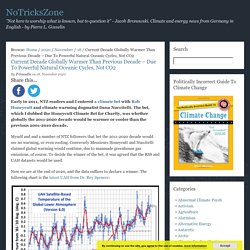
The bet, which I dubbed the Honeycutt Climate Bet for Charity, was whether globally the 2011-2020 decade would be warmer or cooler than the previous 2001-2010 decade. Myself and and a number of NTZ followers that bet the 2011-2020 decade would see no warming, or even cooling. Conversely Messieurs Honeycutt and Nuccitelli claimed global warming would continue, due to manmade greenhouse gas emissions, of course. To decide the winner of the bet, it was agreed that the RSS and UAH datasets would be used. Now we are at the end of 2020, and the data suffices to declare a winner. Chart: Dr. As we can see, before 2016 the global mean temperature had been cooling since 1998, thus establishing what came to be known as “the hiatus”. Ocean Temperature Update. By Andy May A considerable amount of new information on ocean temperature has been gathered since I last wrote about the subject in 2016 here.
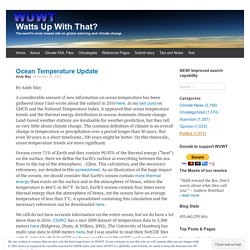
In my last post on GHCN and the National Temperature Index, it appeared that ocean temperature trends and the thermal energy distribution in oceans dominate climate change. Land-based weather stations are invaluable for weather prediction, but they tell us very little about climate change. The common definition of climate is an overall change in temperature or precipitation over a period longer than 30 years.
But even 30 years is a short timeframe, 100 years might be better. Oceans cover 71% of Earth and they contain 99.93% of the thermal energy (“heat”) on the surface. We still do not have accurate information on the entire ocean, but we do have a lot more than in 2016. Figure 1. The temperature drops to a minimum of 1°C at ~4,250 meters and then begins to increase. Arctic Ocean changes driven by sub-Arctic seas. New research explores how lower-latitude oceans drive complex changes in the Arctic Ocean, pushing the region into a new reality distinct from the 20th-century norm.
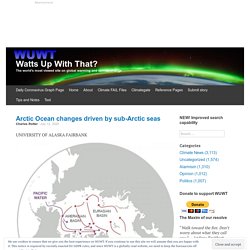
The University of Alaska Fairbanks and Finnish Meteorological Institute led the international effort, which included researchers from six countries. The first of several related papers was published this month in Frontiers in Marine Science. Dynamics of the Tropical Atmosphere and Oceans. Reposted from Dr.
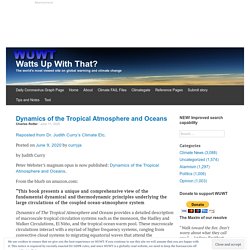
Judith Curry’s Climate Etc. Posted on June 9, 2020 by curryja by Judith Curry Peter Webster’s magnum opus is now published: Dynamics of the Tropical Atmosphere and Oceans. From the blurb on amazon.com: New 80-Year Deep-Ocean Temperature Dataset Compared to a 1D Climate Model. Reposted from Dr.
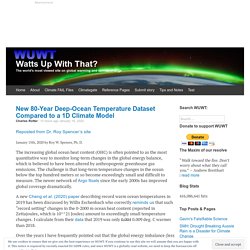
Roy Spencer’s site January 15th, 2020 by Roy W. Spencer, Ph. D. A new Cheng et al. (2020) paper describing record warm ocean temperatures in 2019 has been discussed by Willis Eschenbach who correctly reminds us that such “record setting” changes in the 0-2000 m ocean heat content (reported in Zettajoules, which is 10^^21 Joules) amount to exceedingly small temperature changes. How Water Warms Our Planet. The hydrological cycle.
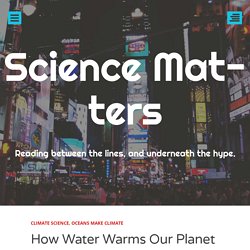
Estimates of the observed main water reservoirs (black numbers in 10^3 km3 ) and the flow of moisture through the system (red numbers, in 10^3 km3 yr À1 ). Adjusted from Trenberth et al. [2007a] for the period 2002-2008 as in Trenberth et al. [2011]. Evidence that Oceans not Man control CO2 emissions - New Climate Model. All the highest concentrations are downwind of warm water.
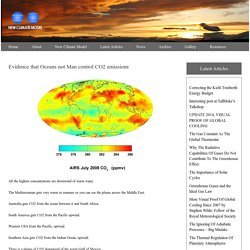
The Mediterranean gets very warm in summer so you can see the plume across the Middle East. Australia gets CO2 from the ocean between it and South Africa. South America gets CO2 from the Pacific upwind. Western USA from the Pacific, upwind. Southern Asia gets CO2 from the Indian Ocean, upwind. New Proxy Data Show Northern Europe Weather Variability In Sync With Natural Factors: Solar Activity, Oceanic Cycles. By P Gosselin on 1.
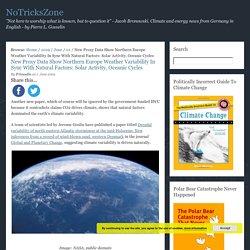
June 2019 Another new paper, which of course will be ignored by the government-funded IPCC because it contradicts claims CO2 drives climate, shows that natural factors dominated the earth’s climate variability. A team of scientists led by Jerome Goslin have published a paper titled Decadal variability of north-eastern Atlantic storminess at the mid-Holocene: New inferences from a record of wind-blown sand, western Denmark in the journal Global and Planetary Change, suggesting climate variability is driven naturally. Image: NASA, public domain. Oceans Govern Climate. IPCC Fatal Error - Neglecting ocean thermal inertia.
“Goodbye anthropogenic global warming.” – Dr Roger Higgs _________________ IPCC Fatal Error – Neglecting ocean thermal inertia The Earth is now cooling, says geologist Dr Roger Higgs, simply based on NASA’s online global monthly temperature chart showing that temperature peaked three years ago (February 2016) and is now declining quite steeply.

If the cooling continues, “man-made-global-warming believers will by 2021 have to admit they were wrong and that CO2 is blameless and that Svensmark’s sun/cosmic ray/cloud/temperature link is correct.” IPCC’s 2013 report (co-author physicist Dr M. Lockwood FRS) says the sun “cannot explain global mean surface warming over the past 25 years, because solar irradiance has declined over this period,” Higgs points out. Instead, says Higgs, the IPCC blames man’s additions of CO2, a gas that totals just 1/2500th [400ppm] of Earth’s atmosphere [near plant-starvation level], and a mere 1/10th of previous historical values. But that assumption is wrong. Climate change. New Paper Finds Oceans Are Source Of “Natural Variability”, Drive “Temperature Extreme Indices” By P Gosselin on 5.
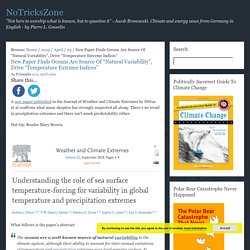
April 2019. New Study: The Tropical Atlantic Was 7.5°C Warmer Than Now While CO2 Was 220 ppm. By Kenneth Richard on 9. May 2019 Another new paper published in Paleoceanography and Paleoclimatology casts further doubt on the paradigm that says CO2 has historically been a temperature driver. The ‘Little Ice Age’ hundreds of years ago is STILL cooling the bottom of Pacific, researchers find. Science: The Deep Ocean Plays A ‘Leading Role’ In Global Warming. It’s Colder Now Than During The 1700s. Authors of a new paper published in the journal Science (Gebbie and Huybers, 2019) insist “the deep ocean ultimately plays a leading role in the planetary heat budget.”
The global deep ocean has much less heat today than it had during both the Medieval Warm Period and the Little Ice Age. Image Source: Gebbie and Huybers, 2019 A Bottom-Up Heat Flux? The deep ocean may warm hundreds (to thousands) of years before hemispheric surface temperatures and CO2 concentrations do (Stott et al., 2007). Image Source: Stott et al., 2007. Study reconstructing ocean warming finds ocean circulation changes may account for significant portion of sea level rise.
Study suggests that in the last 60 years up to half the observed warming and associated sea level rise in low- and mid- latitudes of the Atlantic Ocean is due to changes in ocean circulation. Over the past century, increased greenhouse gas emissions have given rise to an excess of energy in the Earth system. “Differences between ocean circulation and climate more generally” by Carl Wunsch 2010. Post July 25th, 2018 Talking about the difference between ocean circulation and climate more generally is per se a strong massage that there is a strong correlation.
Back in 1984 Carl Wunsch discussed the matter already lengthy in: ”The Global Climate”, ed. John T. Houghton, Cambridge p.189-203). He raises a number of topics, saying for example: “The role of the ocean in climate and climate change is unlikely to be demonstrated and understood until observations become meaningful in terms of physics being tested” (p.189); and “There is no substitute for adequate data”, (p.200). More recently Carl Wunsch published the paper “Towards Understanding the Paleocean” (Quaternary Science Review, 2010, p. 1960-1967). - The Washington Post. Reevaluating the Ocean Conveyer Belt. Earth’s polar regions communicate via oceanic ‘postcards,’ atmospheric ‘text messages’ Caption Freshly drilled segment of the WAIS Divide ice core is brought to the surface. Credit Tommy Cox Usage Restrictions None CORVALLIS, Ore. – Scientists have documented a two-part climatic connection between the North Atlantic Ocean and Antarctica, a fast atmospheric channel and a much slower oceanic one, that caused rapid changes in climate during the last ice age – and may again.
Precipitation and ocean circulation changes linked during the Little Ice Age. The Ocean Climate Spin Zone. New paper tries to disentangle global warming from natural ocean variations. Improving Estimates of Long-Term Climate Sensitivity. UK’s Hot Summer Linked To Cold Atlantic. ATLANTIC ‘TRIPOLE’ OF OCEAN TEMPERATURES DRIVING HURRICANE SEASON AND EUROPE’S CRAZY SUMMER. Follow the Water–Arctic Ocean Flywheels. Spitsbergen Triangle: Ground Zero for Climate Mysteries. Credit to Dr. Bernaerts for his writings on this subject, excerpts of which appear below. Study: CO2 rise after last ice age didn’t need man-made influences, just the deep Pacific Ocean. Scientists trace atmospheric rise in CO2 during deglaciation to deep Pacific Ocean CORVALLIS, Ore. – Long before humans started injecting carbon dioxide into the atmosphere by burning fossil fuels like oil, gas, and coal, the level of atmospheric CO2rose significantly as the Earth came out of its last ice age.
Carbon ‘leak’ may have warmed the planet for 11,000 years, encouraging human civilization. Bucket list: Historic global ocean temperature data – the missing pedigree is a comedy of errors. Geological Activity Not 'Atlantification' Altering Arctic. False Alarm: New Study Finds Global Ocean Warmed By 0.02°C From 1994-2013, With Cooling Below 3600m. Ocean indicators suggest CO2 isn’t the strongest driver of climate. Impact of recent forcing and ocean heat uptake data on estimates of climate sensitivity. Timing Is Everything. TAO Sea and Air Temperature Differences. Quantifying Natural Climate Change. Watching Thunderstorms Chase The Hot Spots. Oceans Govern Climate. Empirical Evidence: Oceans Make Climate.
Ocean Cycles, Not Humans, May Be Behind Most Observed Climate Change. 25 Papers: Natural Forcing Explains Why The Globe’s Oceans Have Been Recently Warming AND Cooling. North Atlantic variability and its links to European climate over the last 3000 years. New study from Scripps puts a crimp on claims of recent rising ocean temperatures. 2 New Papers Indicate Modern Climate Still In A ‘Colder Stage’, Modulated By Solar Activity, ENSO. An Earnest Discovery of Climate Causality. Ocean cycles, The Pause and Global Warming. Chinese Scientists Identify Natural Driving Forces Of Climate Change. A Shower Of Papers, New Climate Models, Show Natural Oceanic Cycles The Recent Major Climate Factor! 20 New Papers Affirm Modern Climate Is In Phase With Natural Variability. THE HOCKEY SCHTICK: New paper finds Pacific Ocean has been significantly warmer than the present throughout vast majority of past 10,000 years. Warming by [less] Upwelling of Cold Ocean Water.
‘Warming’ and ‘The Pause’ Explained By Wind, Upwelling And Mixing. New Paper: Human Climate Forcing ‘Below Detection’ … Deep Oceans Warm By ‘2°C Within 200 Years’ 100% Naturally. Ocean cycles, The Pause and Global Warming. Ocean Surface Temps–How Low Will They Go? Study Reveals The Atmospheric Footprint Of Global Warming Hiatus. No butterflies, just tropical rainfall. Is Ocean Heat Content Data All It’s Stacked Up to Be? Danish Scientist Targets Claim that Gulf Stream is Slowing - Principia Scientific International. North Atlantic Cooling Has Plunged Below 1950s (And 1800s) Levels – And Scientists Project More Cooling. A Summary of Meehl, et al., 2016 and the Interdecadal Pacific Oscillation. Oceans Make 2015 & 2016 Climate.
Recovering Whales, Ocean Acidification, and Climate Horror Stories. Detection and Attribution of Man-made Climate Change. Another New Paper Reveals No Discernible Human Influence On Global Ocean Temperatures, Climate. The Pause hangs on by its fingernails. Political science: a response to 375 concerned members of the National Academy of Sciences.